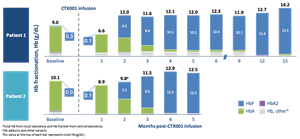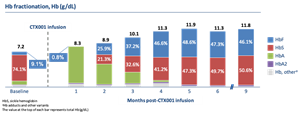-Beta thalassemia: Two patients are transfusion independent at 5 and 15 months after CTX001 infusion; data demonstrate clinical proof-of-concept for CTX001 in transfusion-dependent beta thalassemia-
-Sickle cell disease: Patient is free of vaso-occlusive crises at 9 months after CTX001 infusion-
-Five patients with beta thalassemia and two patients with sickle cell disease have been treated to date with CTX001 and all have successfully engrafted-
ZUG, Switzerland and CAMBRIDGE, Mass. and BOSTON, June 12, 2020 (GLOBE NEWSWIRE) -- CRISPR Therapeutics (Nasdaq: CRSP) and Vertex Pharmaceuticals Incorporated (Nasdaq: VRTX) today announced new clinical data for CTX001, an investigational CRISPR/Cas9 gene-editing therapy, from the CLIMB-111 and CLIMB-121 Phase 1/2 trials in transfusion-dependent beta thalassemia (TDT) and severe sickle cell disease (SCD), and highlighted recent progress in the CTX001 development program. These data were presented during an oral presentation at the European Hematology Association (EHA) virtual congress by Dr. Selim Corbacioglu, Professor of Pediatrics and the Chair of Pediatric Hematology, Oncology, and Stem Cell Transplantation, Regensburg University Hospital, Regensburg, Germany.
CLIMB-111 Trial in Transfusion-Dependent Beta Thalassemia Updated Results
Data presented today at EHA demonstrate clinical proof-of-concept for CTX001 in TDT. Data include longer-duration follow-up data for the first patient with TDT treated with CTX001 and new data for the second TDT patient treated. CRISPR Therapeutics and Vertex announced initial data for the first TDT patient in November of 2019.
Patient 1 with TDT has the β0/IVS-I-110 genotype, which is associated with a severe phenotype similar to β0/β0, and had a transfusion requirement of 34 units of packed red blood cells per year (annualized rate during the two years prior to consenting for the trial) before enrolling in the clinical trial. As previously reported, the patient achieved neutrophil engraftment 33 days after CTX001 infusion and platelet engraftment 37 days after infusion. After CTX001 infusion, two serious adverse events (SAEs) occurred, neither of which the principal investigator (PI) considered related to CTX001: pneumonia in the presence of neutropenia, and veno-occlusive liver disease attributed to busulfan conditioning; both subsequently resolved. New data presented today show that at 15 months after CTX001 infusion, the patient was transfusion independent and had total hemoglobin levels of 14.2 g/dL, fetal hemoglobin of 13.5 g/dL, and F-cells (erythrocytes expressing fetal hemoglobin) of 100.0%. Bone marrow allelic editing was 78.1% at 6 months and 76.1% at one year.
Patient 2 with TDT has the β0/IVS-II-745 genotype and had a transfusion requirement of 61 units of packed red blood cells per year (annualized rate during the two years prior to consenting for the trial) before enrolling in the clinical trial. The patient achieved neutrophil engraftment 36 days after CTX001 infusion and platelet engraftment 34 days after infusion. After CTX001 infusion, two SAEs occurred, neither of which the PI considered related to CTX001: pneumonia and an upper respiratory tract infection; both subsequently resolved. At 5 months after CTX001 infusion, the patient was transfusion independent and had total hemoglobin levels of 12.5 g/dL, fetal hemoglobin of 12.2 g/dL, and F-cells (erythrocytes expressing fetal hemoglobin) of 99.4%.
Hemoglobin data over time are presented for Patient 1 and Patient 2 below.
Figure 1 accompanying this announcement is available at https://www.globenewswire.com/NewsRoom/AttachmentNg/35581299-d683-44b0-a75e-7a1a9b9fe9eb

Total hemoglobin and hemoglobin fractionation data over time for TDT Patients 1 and 2
CLIMB-121 Trial in Severe Sickle Cell Disease Updated Results
Data presented today at EHA reflect longer-duration follow-up data for the first patient with SCD treated with CTX001. CRISPR Therapeutics and Vertex announced initial data for this first SCD patient in November of 2019.
Patient 1 with SCD experienced seven vaso-occlusive crises (VOCs) and five packed red blood cell transfusions per year (annualized rate during the two years prior to consenting for the trial) before enrolling in the clinical trial. As previously reported, the patient achieved neutrophil and platelet engraftment 30 days after CTX001 infusion. After CTX001 infusion, three SAEs occurred, none of which the PI considered related to CTX001: sepsis in the presence of neutropenia, cholelithiasis and abdominal pain; all subsequently resolved. New data presented today show that at 9 months after CTX001 infusion, the patient was free of VOCs, was transfusion independent and had total hemoglobin levels of 11.8 g/dL, 46.1% fetal hemoglobin, and F-cells (erythrocytes expressing fetal hemoglobin) of 99.7%. Bone marrow allelic editing was 81.4% at 6 months. Figure 2 presents the hemoglobin data over time for this patient.
Figure 2 accompanying this announcement is available at https://www.globenewswire.com/NewsRoom/AttachmentNg/7610c5bd-25c8-4f5b-be86-8bc16ed57eb1

Total hemoglobin and hemoglobin fractionation data over time for SCD Patient 1
“With these new data, we are beginning to see early evidence of the potential durability of benefit from treatment with CTX001, as well as consistency of the therapeutic effect across patients,” said Samarth Kulkarni, Ph.D., Chief Executive Officer of CRISPR Therapeutics. “These highly encouraging early data represent one more step toward delivering on the promise and potential of CRISPR/Cas9 therapies as a new class of potentially transformative medicines to treat serious diseases.”
“The data announced today are remarkable, including the demonstration of clinical proof-of-concept in TDT,” said Reshma Kewalramani, M.D., Chief Executive Officer and President of Vertex. “While these are still early days, these data mark another important milestone for this program and for the field of gene editing. The results presented at this medical conference add to results previously shared demonstrating that CRISPR/Cas9 gene editing has the potential to be a curative therapy for severe genetic diseases like sickle cell and beta thalassemia.”
“In my 25 years of caring for children and young adults facing both sickle cell disease and beta thalassemia, I have seen how these diseases can adversely affect patients’ lives in very significant ways,” said Dr. Haydar Frangoul, Medical Director of Pediatric Hematology and Oncology at Sarah Cannon Research Institute, HCA Healthcare’s TriStar Centennial Medical Center and senior author of the abstract presented at the EHA virtual congress. “I am encouraged by the preliminary results, which demonstrate, in essence, a functional cure for patients with beta thalassemia and sickle cell disease.”
Recent Progress in the Phase 1/2 Clinical Trials
CLIMB-111 for TDT has dosed a total of 5 patients, and all patients have successfully engrafted. The trial is also now open for concurrent dosing after successful dosing and engraftment of the first two patients. Additionally, CLIMB-111 has been expanded to allow enrollment of β0/β0 patients and is in the process of being expanded to allow enrollment of pediatric patients ages 12 years or older.
CLIMB-121 for SCD has dosed a total of 2 patients and both patients have successfully engrafted. The trial is also now open for concurrent dosing after successful dosing and engraftment of these first two patients.
The initial safety profile in these trials appears to be consistent with myeloablative busulfan conditioning and an autologous hematopoietic stem cell transplant.
In March 2020, clinical trial sites in the U.S. and Europe temporarily paused their elective hematopoietic stem cell transplant programs due to the COVID-19 pandemic, and as a result, CRISPR and Vertex temporarily paused conditioning and dosing in these trials. Enrollment, mobilization and drug product manufacturing in each trial remains ongoing. The companies are now in the process of re-initiating dosing with CTX001 at certain clinical trial sites. The CLIMB-111 and CLIMB-121 clinical trials are ongoing, and patients will be followed for 2 years following CTX001 infusion. The companies expect to provide additional data in the second half of 2020.
About CTX001
CTX001 is an investigational ex vivo CRISPR gene-edited therapy that is being evaluated for patients suffering from TDT or severe SCD in which a patient’s hematopoietic stem cells are engineered to produce high levels of fetal hemoglobin (HbF; hemoglobin F) in red blood cells. HbF is a form of the oxygen-carrying hemoglobin that is naturally present at birth, which then switches to the adult form of hemoglobin. The elevation of HbF by CTX001 has the potential to alleviate transfusion requirements for TDT patients and reduce painful and debilitating sickle crises for SCD patients.
Based on progress in this program to date, CTX001 has been granted Regenerative Medicine Advanced Therapy (RMAT) from the U.S. FDA, Orphan Drug Designation from both the FDA and the European Medicines Agency (EMA), and Fast Track Designation from the FDA for both SCD and TDT.
CTX001 is being developed under a co-development and co-commercialization agreement between CRISPR Therapeutics and Vertex. CTX001 is the most advanced gene-editing approach in development for TDT and SCD.
About CLIMB-111
The ongoing Phase 1/2 open-label trial, CLIMB-Thal-111, is designed to assess the safety and efficacy of a single dose of CTX001 in patients ages 18 to 35 with TDT. The trial will enroll up to 45 patients and follow patients for approximately two years after infusion. Each patient will be asked to participate in a long-term follow-up trial.
About CLIMB-121
The ongoing Phase 1/2 open-label trial, CLIMB-SCD-121, is designed to assess the safety and efficacy of a single dose of CTX001 in patients ages 18 to 35 with severe SCD. The trial will enroll up to 45 patients and follow patients for approximately two years after infusion. Each patient will be asked to participate in a long-term follow-up trial.
About the Gene-Editing Process in These Trials
Patients who enroll in these trials will have their own hematopoietic stem and progenitor cells collected from peripheral blood. The patient’s cells will be edited using the CRISPR/Cas9 technology. The edited cells, CTX001, will then be infused back into the patient as part of a stem cell transplant, a process which involves, among other things, a patient being treated with myeloablative busulfan conditioning. Patients undergoing stem cell transplants may also encounter side effects (ranging from mild to severe) that are unrelated to the administration of CTX001. Patients will initially be monitored to determine when the edited cells begin to produce mature blood cells, a process known as engraftment. After engraftment, patients will continue to be monitored to track the impact of CTX001 on multiple measures of disease and for safety.
About the CRISPR-Vertex Collaboration
CRISPR Therapeutics and Vertex entered into a strategic research collaboration in 2015 focused on the use of CRISPR/Cas9 to discover and develop potential new treatments aimed at the underlying genetic causes of human disease. CTX001 represents the first treatment to emerge from the joint research program. CRISPR Therapeutics and Vertex will jointly develop and commercialize CTX001 and equally share all research and development costs and profits worldwide.
About CRISPR Therapeutics
CRISPR Therapeutics is a leading gene editing company focused on developing transformative gene-based medicines for serious diseases using its proprietary CRISPR/Cas9 platform. CRISPR/Cas9 is a revolutionary gene editing technology that allows for precise, directed changes to genomic DNA. CRISPR Therapeutics has established a portfolio of therapeutic programs across a broad range of disease areas including hemoglobinopathies, oncology, regenerative medicine and rare diseases. To accelerate and expand its efforts, CRISPR Therapeutics has established strategic collaborations with leading companies including Bayer, Vertex Pharmaceuticals and ViaCyte, Inc. CRISPR Therapeutics AG is headquartered in Zug, Switzerland, with its wholly-owned U.S. subsidiary, CRISPR Therapeutics, Inc., and R&D operations based in Cambridge, Massachusetts, and business offices in San Francisco, California and London, United Kingdom. For more information, please visit www.crisprtx.com.
CRISPR Therapeutics Forward-Looking Statement
This press release may contain a number of “forward-looking statements” within the meaning of the Private Securities Litigation Reform Act of 1995, as amended, including statements made by Dr. Kulkarni, Dr. Kewalramani and Dr. Frangoul in this press release, as well as statements regarding CRISPR Therapeutics’ expectations about any or all of the following: (i) the status of clinical trials (including, without limitation, the expected timing of data releases and activities at clinical trial sites) related to product candidates under development by CRISPR Therapeutics and its collaborators, including expectations regarding the data that is being presented at the European Hematology Association’s virtual congress; (ii) the expected benefits of CRISPR Therapeutics’ collaborations; and (iii) the therapeutic value, development, and commercial potential of CRISPR/Cas9 gene editing technologies and therapies. Without limiting the foregoing, the words “believes,” “anticipates,” “plans,” “expects” and similar expressions are intended to identify forward-looking statements. You are cautioned that forward-looking statements are inherently uncertain. Although CRISPR Therapeutics believes that such statements are based on reasonable assumptions within the bounds of its knowledge of its business and operations, forward-looking statements are neither promises nor guarantees and they are necessarily subject to a high degree of uncertainty and risk. Actual performance and results may differ materially from those projected or suggested in the forward-looking statements due to various risks and uncertainties. These risks and uncertainties include, among others: potential impacts due to the coronavirus pandemic, such as the timing and progress of clinical trials; the potential for initial and preliminary data from any clinical trial and initial data from a limited number of patients (as is the case with CTX001 at this time) not to be indicative of final trial results; the potential that CTX001 clinical trial results may not be favorable; that future competitive or other market factors may adversely affect the commercial potential for CTX001; uncertainties regarding the intellectual property protection for CRISPR Therapeutics’ technology and intellectual property belonging to third parties, and the outcome of proceedings (such as an interference, an opposition or a similar proceeding) involving all or any portion of such intellectual property; and those risks and uncertainties described under the heading "Risk Factors" in CRISPR Therapeutics’ most recent annual report on Form 10-K, and in any other subsequent filings made by CRISPR Therapeutics with the U.S. Securities and Exchange Commission, which are available on the SEC's website at www.sec.gov. Existing and prospective investors are cautioned not to place undue reliance on these forward-looking statements, which speak only as of the date they are made. CRISPR Therapeutics disclaims any obligation or undertaking to update or revise any forward-looking statements contained in this press release, other than to the extent required by law.
About Vertex
Vertex is a global biotechnology company that invests in scientific innovation to create transformative medicines for people with serious diseases. The company has multiple approved medicines that treat the underlying cause of cystic fibrosis (CF) — a rare, life-threatening genetic disease — and has several ongoing clinical and research programs in CF. Beyond CF, Vertex has a robust pipeline of investigational small molecule medicines in other serious diseases where it has deep insight into causal human biology, including pain, alpha-1 antitrypsin deficiency and APOL1-mediated kidney diseases. In addition, Vertex has a rapidly expanding pipeline of genetic and cell therapies for diseases such as sickle cell disease, beta thalassemia, Duchenne muscular dystrophy and type 1 diabetes mellitus.
Founded in 1989 in Cambridge, Mass., Vertex's global headquarters is now located in Boston's Innovation District and its international headquarters is in London, UK. Additionally, the company has research and development sites and commercial offices in North America, Europe, Australia and Latin America. Vertex is consistently recognized as one of the industry's top places to work, including 10 consecutive years on Science magazine's Top Employers list and top five on the 2019 Best Employers for Diversity list by Forbes. For company updates and to learn more about Vertex's history of innovation, visit www.vrtx.com or follow us on Facebook, Twitter, LinkedIn, YouTube and Instagram.
Vertex Special Note Regarding Forward-Looking Statements
This press release contains forward-looking statements as defined in the Private Securities Litigation Reform Act of 1995, including, without limitation, statements made by Dr. Kulkarni, Dr. Kewalramani and Dr. Frangoul in this press release, and statements regarding our plans and expectations for our clinical trials and clinical trial sites, and our expectations regarding future data announcements. While Vertex believes the forward-looking statements contained in this press release are accurate, these forward-looking statements represent the company's beliefs only as of the date of this press release and there are a number of risks and uncertainties that could cause actual events or results to differ materially from those expressed or implied by such forward-looking statements. Those risks and uncertainties include, among other things, that data from the company's development programs may not support registration or further development of its compounds due to safety, efficacy or other reasons, and other risks listed under Risk Factors in Vertex's annual report and subsequent quarterly reports filed with the Securities and Exchange Commission and available through the company's website at www.vrtx.com. Vertex disclaims any obligation to update the information contained in this press release as new information becomes available.
(VRTX-GEN)
CRISPR Therapeutics Investor Contact:
Susan Kim, +1 617-307-7503
susan.kim@crisprtx.com
CRISPR Therapeutics Media Contact:
Rachel Eides
WCG on behalf of CRISPR
+1 617-337-4167
reides@wcgworld.com
Vertex Pharmaceuticals Incorporated
Investors:
Michael Partridge, +1 617-341-6108
or
Zach Barber, +1 617-341-6470
or
Brenda Eustace, +1 617-341-6187
Media:
mediainfo@vrtx.com
or
U.S.: +1 617-341-6992
or
Heather Nichols: +1 617-839-3607
or
International: +44 20 3204 5275



